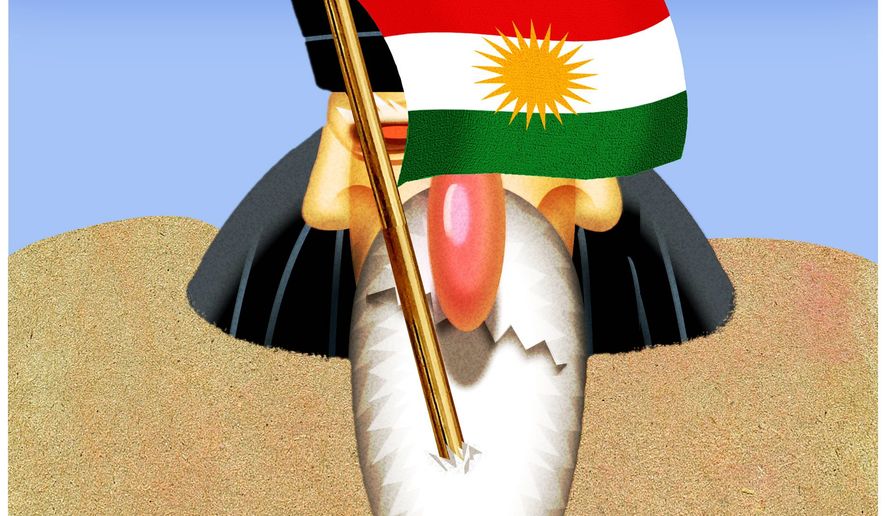Toward an independent Kurdistan
By James A. Lyons - - Thursday, October 19, 2017
ANALYSIS/OPINION:
The autonomous Kurdistan region of northern Iraq held a referendum on independence on Sept. 25. It was overwhelmingly approved. This referendum, not surprisingly however, has precipitously raised tensions not only with Iraq but also with Turkey, Syria and Iran, all of which have large — and restive — Kurdish minorities.
Baghdad already has made moves to isolate the Kurdish region by banning all international flights from landing there and demanding a halt to all crude oil sales. And although Ankara has quarreled repeatedly with the Iranian puppet regime in Baghdad in recent years, the Turkish government late on Oct. 16 decided to close not only Turkish airspace to flights to and from the Kurdish region of northern Iraq, but also to close the Irbil-Ceyan oil pipeline, which is the Kurds’ only source of revenue. Additionally, Turkish and Iraqi troops had held joint military exercises shortly after the Sept. 25 referendum vote.
In what may presage a new and violent phase in the break-up of Sykes-Picot Iraq, Baghdad moved aggressively on Oct. 16, sending Iraqi Army troops into the disputed oil-rich city of Kirkuk. Further, units of the Iraqi Popular Mobilization Forces, a coalition of Shiite paramilitary groups that receive equipment and training from Iran’s Islamic Revolutionary Guard Corps (IRGC), were deployed alongside the Iraqi Army units south and west of Kirkuk. It is a city of a million people that lies just outside the semi-autonomous Kurdish Regional Government territory. When the Iraqi Army deserted Kirkuk in 2014 in the face of the Islamic State onslaught, however, it was the Kurdish Peshmerga forces deployed there that kept the Kirkuk oil fields from falling into the Islamic State’s hands. They have declared that they are now not about to give up that territory. Maj. Gen. Qassem Soleimani, who is the commander of the IRGC Qods Force in charge of Iran’s foreign operations, arrived in Kurdistan on Oct. 15 for discussions — but only with the Patriotic Union of Kurdistan (PUK), not the rival Kurdistan Democratic Party (KDP). He apparently presented Baghdad’s demands that the Kurdish Regional Government cancel the referendum results as a precondition for talks to resolve the current dispute. KRG officials led by President Masoud Barzani not only previously had rejected any such demands, but pledged to defend Kurdish-held territory in case of attack.
With Iranian-dominated Iraqi and Shiite militia forces now in control of Kirkuk, though, at least in part due to apparent PUK treachery, the region and its deeply divided factions may be poised on the brink of yet another explosion. According to reports, the KDP Peshmerga forces fought hard to avoid being pushed out of Kirkuk, but ultimately had to retreat when their ammunition ran out. Thousands of civilians and Peshmerga fighters fled toward Irbil and Sulaymaniyah.
Unfortunately, with the Obama and Muslim Brotherhood holdovers still in key positions in the National Security Council, State Department and Department of Defense, the U.S. position has been to back the Iranian Baghdadpuppet regime.
The Sykes-Picot agreement of 1916 is dead. The U.S. must recognize the realities on the ground. The former Iraq, like the former Syria, has always been an artificial construct, cobbled together by European powers in the wake of the collapse of the Ottoman Empire. Absent the brute force of a dictator, these entities simply cannot hold together against the clashing centrifugal forces of their feuding ethnic, sectarian and tribal components.
Toward an independent Kurdistan
![Toward an independent Kurdistan]() Reviewed by Rizwan
on
1:49 AM
Rating: 5
Reviewed by Rizwan
on
1:49 AM
Rating: 5




No comments: